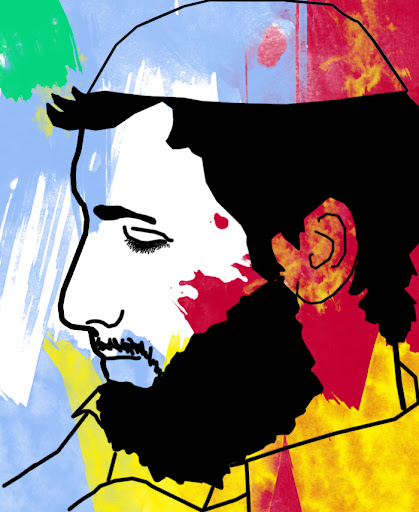Based on a comment in Sweat and all, read the post there first.

The Rebbe is a Tatte, he wants to hear from us, he wants our hearts -not be looked at as a statue on a pedestal.
Yet we must also make sure that when we come to the Rebbe, when we grab on to the the proverbial klamke, to his door-knob -his coat tails -we don't drag him in the blotte , the mud, in which we wallow. For a child to wipe his sweat on the Rebbe's kapote, is the ultimate act off love -he did it because for a small child, depending upon a parent for such basic needs is how he connects.
But for an older person to do so would be wrong.
What the Rebbe wants is for us to come to him as who we are and let him in. A dancer came to the Rebbefor yechidus, private audience, and told him that he wanted to give something to the Rebbe -but being a simple Jew, all he could do was his job -to dance.
So there, in yechidus, in gan eden ha'elyon, he danced.
He danced and the Rebbe clapped.
By this simple Jew, dancing was where he was at . . . he had given himself over to the Rebbe.
There in lies the Rebbe's answer to the worried mother -"If you only knew the great (spiritual) pleasure that gave me. If only it was this way with the adults ("Ein leshaer godel hanachas ruach, v'halvai hoyo mein ze bagedolim")."
Not that, G-d Forbid, we should use the Rebbe to clean off our own sweat -but rather each on his own level must come as a child to his father -for some even a simple act, such as what this child did, is how he comes . . . for others it is like the dancer . . .
We must come to the Rebbe, but we must go up to him, not drag him down to us.
In truth, as in most things with life, the proof is in the process . . .
a story is related that a chossid of the Maggid once enticed a Litvishe scholar to travel to Mezritch. When the Litvak arrived, he went into Maggid and handed him an encoded note from the chossid. The note said that the person who would present it to the Maggid was sick -sick with a spiritual affliction, still uncouth with out the learning of Chassidus.
the Maggid looked upon the face of the man who stood across from him, then at the note, then once more upon the note.
"How odd," he exclaimed in wonder. "This note says that the man is sick, yet I do not see it upon his face."
At last the Maggid came upon an answer.
"When the note had been written, this man was unrefined . . . but the journey to Mezritch has refined him."
Perhaps then, if we reach out to the Rebbe with our sweaty hands . . . then the process itself will bring us closer to him.
_______________________________________
- Mottel said...
-
I realized after writing this that someone would most likely point out what you did . . .
The truth is that I didn't come to abrogate the point of Live From The Hill Top's post -that remains true- but rather to rethink the connection between Rebbe and Chossid. Had I come to write something new, you point would be correct, but since I merely come to bring light on a particular issue, it would be extra (if not redundant to speak of the nimshal as it were)
In general the Frierdike Rebbe said that had Shlomo Hamelech been a chossid, he would have written Shir Hashirim as the love between a Rebbe and Chossid and not between a husband and wife.
But perhaps, dare I say, that there is in truth no problem to speak about the hiskashrus between a chossid and Rebbe with out, kavyachol, making it into a nimshal!
When one writes of the love between a physical father and son, or a husband and wife, does one ask as to why the comparison to our relationship with the Creator has been left out?
Technorati Tags: Rebbe, Chabad, Comments, Blogging, Thoughts, Chassidus








notice how all of the descriptions u used about the Rebbe, in the Tanya they are all used to refer to HaShem?
The original post davka tied relating to the Rebbe in such a fashion as a way to understand and grow to relate to HaShem in that fashion..
you left out the relating to HaShem part in your own post.